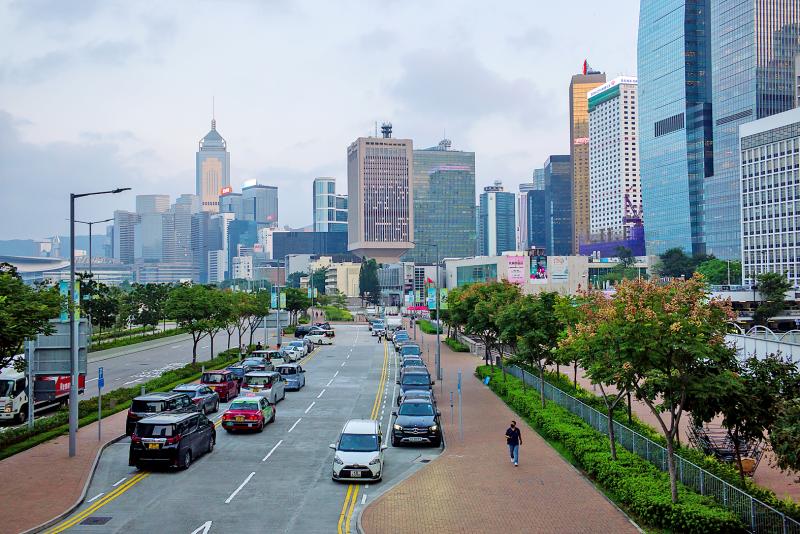Chinese President Xi Jinping (習近平) has deployed a top Xinjiang police official to command the nation’s army post in Hong Kong, raising fears that Beijing is taking an increasingly hard line on security in the territory.
Major General Peng Jingtang (彭京堂) is to become commander of the People’s Liberation Army’s (PLA) Hong Kong garrison at the request of Xi, the Chinese Ministry of National Defense said in a statement.
Peng was previously deputy chief of staff for the armed police force in China’s Xinjiang region, where the US government has accused China of repressive polices against Uighur Muslims, saying the policies amount to genocide. Beijing strongly denies the charge.

Photo: Bloomberg
China has in the past few years installed officials with experience heading crackdowns in key Hong Kong roles.
In early 2020, Luo Huining (駱惠寧), a Chinese Communist Party stalwart known for executing Xi’s anti-corruption campaign, became head of the central government’s powerful Liaison Office in the territory.
Xia Baolong (夏寶龍), known for prosecuting a campaign against Christian churches in Zhejiang Province, was named director of the Hong Kong and Macau Affairs Office that same year.
Hong Kong has also put former career police officers in key government roles in the wake of the territory’s large anti-government protests in 2019.
Former secretary for security John Lee (李家超) in June last year rose to the territory’s No. 2 government position — chief secretary for administration — while former police commissioner Chris Tang (鄧炳強) became security secretary.
The defense ministry said in a statement that Peng would work to “resolutely safeguard national sovereignty, security and development interests, and firmly safeguard” the stability of Hong Kong.
Last week, the Hong Kong garrison of the PLA conducted a high-profile drill to “demonstrate its confidence and determination to defend” the territory after Xi called on the military to adopt the latest technology to win future conflicts, the South China Morning Post reported.

The US government has signed defense cooperation agreements with Japan and the Philippines to boost the deterrence capabilities of countries in the first island chain, a report by the National Security Bureau (NSB) showed. The main countries on the first island chain include the two nations and Taiwan. The bureau is to present the report at a meeting of the legislature’s Foreign Affairs and National Defense Committee tomorrow. The US military has deployed Typhon missile systems to Japan’s Yamaguchi Prefecture and Zambales province in the Philippines during their joint military exercises. It has also installed NMESIS anti-ship systems in Japan’s Okinawa

‘WIN-WIN’: The Philippines, and central and eastern European countries are important potential drone cooperation partners, Minister of Foreign Affairs Lin Chia-lung said Minister of Foreign Affairs Lin Chia-lung (林佳龍) in an interview published yesterday confirmed that there are joint ventures between Taiwan and Poland in the drone industry. Lin made the remark in an exclusive interview with the Chinese-language Liberty Times (the Taipei Times’ sister paper). The government-backed Taiwan Excellence Drone International Business Opportunities Alliance and the Polish Chamber of Unmanned Systems on Wednesday last week signed a memorandum of understanding in Poland to develop a “non-China” supply chain for drones and work together on key technologies. Asked if Taiwan prioritized Poland among central and eastern European countries in drone collaboration, Lin

BACK TO WORK? Prosecutors said they are considering filing an appeal, while the Hsinchu City Government said it has applied for Ann Kao’s reinstatement as mayor The High Court yesterday found suspended Hsinchu mayor Ann Kao (高虹安) not guilty of embezzling assistant fees, reducing her sentence to six months in prison commutable to a fine from seven years and four months. The verdict acquitted Kao of the corruption charge, but found her guilty of causing a public official to commit document forgery. The High Prosecutors’ Office said it is reviewing the ruling and considering whether to file an appeal. The Taipei District Court in July last year sentenced Kao to seven years and four months in prison, along with a four-year deprivation of civil rights, for contravening the Anti-Corruption

NO CONFIDENCE MOTION? The premier said that being toppled by the legislature for defending the Constitution would be a democratic badge of honor for him Premier Cho Jung-tai (卓榮泰) yesterday announced that the Cabinet would not countersign the amendments to the local revenue-sharing law passed by the Legislative Yuan last month. Cho said the decision not to countersign the amendments to the Act Governing the Allocation of Government Revenues and Expenditures (財政收支劃分法) was made in accordance with the Constitution. “The decision aims to safeguard our Constitution,” he said. The Constitution stipulates the president shall, in accordance with law, promulgate laws and issue mandates with the countersignature of the head of the Executive Yuan, or with the countersignatures of both the head of the Executive Yuan and ministers or